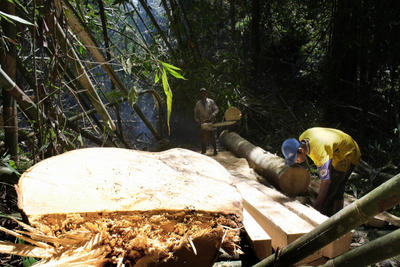Green group lobbying and protests consistently hamper efforts to reduce impediments to trade in forums such as the WTO.
The two primary concerns of environmental interests are that: first, as the volume of trade grows, more scarce natural resources are being used. And, second, that with more trade and its associated increases in economic growth and wealth comes increased environmental harm.
One example of environmental interests challenging the expansion of trade involves timber harvested from tropical forests in Indonesia and the Amazon. The main concern is deforestation, which is associated with environmental degradation, including biodiversity loss and waterway siltation.
In response to political pressure exerted by environmental groups such as Greenpeace, developed countries have introduced policies to restrict trade in timber, for example by requiring timber to be ‘certified’ as being produced ‘sustainably’ before it can be offered for sale.
Though these certification schemes may be intuitively appealing, deeper analysis reveals that their application may be inherently damaging to society’s well-being.
Because certification schemes effectively act as ‘gate-keepers’ to market access, the ability to gain certification becomes valuable to suppliers. In this context, who sets the certification standards and what the content of those standards are, achieves considerable significance. These matters often become the subject of lobbying activity, and so the certification process delivers outcomes determined by relative political influence and gives no guarantee of delivering socially desirable outcomes.
For those aspiring suppliers who do not pass the certification test, the expenses of undertaking the test are incurred without return. And the costs of submitting to the test must be paid by producers whose activities are already regulated by strong local authorities.
All of this certification activity involves the creation of a whole new industry comprising both public sector regulators and private sector parties (such as inspectors and consultants). Ironically, that means the use of more scarce resources that could have been used in other activities that society finds valuable. And a whole new variety of corruption has been created as potential suppliers seek ways of achieving access to the restricted market.
It is not only environmental interests that are keen to limit trade in timber: the industry certifiers and their associated bureaucracies rely on imposing this type of limitations to secure their own livelihoods and so make easy bedfellows for the greens.
But the coalition in favour of restrictions extends further. Certified timber suppliers can benefit from the restrictions to industry entry despite the costs associated with the process because certification ensures reduced competition and can increase the prices of timber. There is an element of monopoly associated with certification schemes. Often it is timber suppliers from developed nations who are most stridently in favour of certification because it reduces the competition they face from developing countries where local environmental regulations are weaker.
The anti-trade coalition between the timber industry and environmentalist groups is reminiscent of the situation that emerged during the prohibition period in the US, when the anti-alcohol movement was effectively supported by those who made fortunes from the sale of illegal liquor. ‘Baptists’ and ‘bootleggers’ made somewhat unexpected partners in the pursuit of a shared objective — the continuation of prohibition.
Forest certification schemes and other environmental barriers to trade reduce society’s well-being by forcing up prices and imposing additional regulatory compliance and administration costs. Furthermore, the effectiveness of certification schemes as a means to achieve environmental goals is limited by the disconnect between the policy measure and the target. Rather than promoting certification schemes that are vulnerable to political and commercial misuse, ‘green’ interests in developed countries should offer assistance to developing country agencies responsible for enacting and enforcing specific, targeted local environmental management policies. An even more direct approach would be for green groups in developed nations to raise funds from individual and corporate donors to pay people in the developing world to provide environmental services from their forests instead of timber.
Jeff Bennet is Professor of Environmental Management at the Crawford School of Public Policy, the Australian National University.
He is the author of ‘Little Green Lies’ (Connor Court Publishing, 2012), available here.

